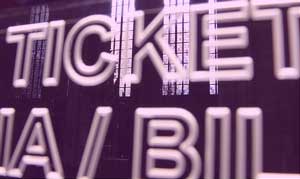AMT Lab welcomes the 2018-2019 academic year with new research tracks, and a grant to study technologically enabled audience engagement methods.
Center for Arts Management and Technology Update
Some of you may have heard that the Center for Arts Management and Technology is undergoing a restructuring process. David Dombrosky, CAMT's former executive director, recently resigned from Carnegie Mellon University. Everyone involved with CAMT thanks him for his service and support these last four years, and we wish him the best as he starts a new chapter in his life. Many of you may know me from my years with CAMT (2004-2009) and my involvement in the founding of its Technology in the Arts resource line. I will be assisting Dan Martin in the restructuring of CAMT to integrate all of its products and services under Technology in the Arts. CAMT is currently not accepting new software clients, but we're continuing to support existing clients during this restructuring process.
Please continue to take advantage of the Technology in the Arts resources, and we look forward to bringing you an even stronger arts and technology service line in the very near future.
If you have any questions, please contact Brad Stephenson at bstephenson@cmu.edu.
The Coming of the Mininar! (Mini + Webinar)
Technology in the Arts is proud to announce that we are starting a series of "mini-nars", short videos that tell you not only the basics on new tech trends, but also how to actually implement them yourself! Hear more about mini-nars here:
Mininar Preview from Technology in the Arts on Vimeo.
The first mini-nar will be released soon with info on what the heck a QR code is, how to make one, and how to track one. With screenshots! And costumes. Get excited.
We are looking for ideas for future mini-nars! If you have an idea for a subject that we could cover in about 5-10 minutes, please comment below or suggest one any time via Facebook or Twitter.
Make your Voice Heard!

- Click here to take survey. Photo: Gyorgy Kovacs via Flickr.
The 2011 Ticketing Software Satisfaction Survey is now live! Now in its second year, we designed this short survey to see how satisfied arts and cultural organizations are with the ticketing software products they are currently using. The survey will close on February 18, and results will be sent to survey participants in April 2011.
Many ticketing software vendors have used the results of last year’s survey to find out what is important to arts and culture managers. This survey is your chance to tell them, and the field at large, how satisfied (or not) you are with your current system.
If you are a box office manager or staff member, house manager, business manager, executive director, board member, marketing staff, or anyone else who has contact with a box office software system, then this survey is for you!
And please share with colleagues by clicking the "ShareThis" icon below.
Technology Needs Assessment Survey
The Center for Arts Management and Technology, the group that brings you the Technology in the Arts blog and podcast, is considering offering a new service to help arts organizations with technology challenges. If you work at at arts organization in any capacity, we would like to learn more about how you use technology in your organizations and how you find help when you need it. Please take a few moments to fill out our survey.
http://www.surveymonkey.com/s/techhelp
Please feel free to share this link with any other arts managers or administrators who you know. If we get enough responses, we'll try and share some of the results with everyone on the blog. Thanks in advance!
Anonymous input, please!
We're putting together a webinar on digitizing art, and want to know what YOU want to know. Please help us make this an experience that benefits you by filling out this 3-question survey. I promise you--it will take less time than it took you to fill out the Census. Even if you are the only person living in your household.
Thanks!
Tech Planning for Arts Managers: A Nuts and Bolts Webinar on Implementing Technology at Your Organization
On September 2nd Brad Stephenson, host of the popular monthly Technology in the Arts podcast, will lead a new webinar entitled ”Technology Planning for Arts Managers”. Designed to meet the needs of today’s arts managers, this workshop will focus on ways in which arts managers can use technology to best meet their missions and goals. Stephenson, the former Director of Projects and Marketing for the Center of Arts Management and Technology, worked closely with numerous organizations who wanted to find the best technological tools to improve their efficiency. He "helped these organizations with a number of things, including the evaluation of technology vendors, the design and development of web-based marketing and development tools and the selection of software and hardware products."
Organizations commonly make some mistakes that actually impede the organization/technology synergy. Too often Stephenson witnessed organizations either failing to align their technology with strategic plan, or worse, failing to develop a strategic plan at all. Without a plan, there is no way to guide technological decisions in a way that will best serve an organization. Additionally, organizations often failed to do research--such as calling similar organizations to get thoughts on the tech tools that were of most use to them.
Stephenson strongly believes that an organization that fails to plan for technology is "committing a major arts management sin," one which may compromise the organization's mission and unwisely drain resources: "Everyone on staff doesn't get an iPhone just because they're cool." Stephenson has designed this workshop to coach organizations through the process of integrating technology into an organization's operations. "Tech projects are really no different from other projects within an organization. You still use the same basic project management approach to building a new website as you would producing a new play. One of the best ways to start any new tech planning process or technology project is to ensure that you have buy-in from everyone on your staff." Meeting resistance? Stephenson will discuss ways to address such resistance during the September 2 webinar.
In today’s climate it is necessary for arts managers to understand technology and its application within their organizations. While it’s easy to say “integrate technology into your organization,” in practice it can be overwhelming. This workshop provides a step-by-step examination of an effective technology planning process, coupled with an overview of the major technology concepts with which arts managers should be comfortable. Participants will gain an understanding of three key concepts:
1. Creating a technology plan for your organization or project 2. Analyzing your current environment to make efficient use of existing technology and effectively target resources 3. Making the right technology choices through proven evaluation methods
To register for the webinar, and for more information, please visit the link below. Technology Planning for Arts Managers September 2, 2009 2:00pm – 3:30pm Eastern Register today for $25.00
Perform a Digital Identity Self-Exam
Digital Identity is a topic that, like Digital Identity itself, cycles through period of seeming quite important (take the Twitter hack) and others when it seems like something toward which a person can take a very hands-off approach. It is easy to fall into the false sense of security offered by social media's seeming self-management; it can appear harmless to just allow it to so do. As individuals and representatives of organizations, it is valuable to periodically take stock of what the organization and its employees are doing to represent themselves online. One of the first posts I wrote for this blog was about the blurry line between professional and personal identities--and that gets even blurrier across the online/offline divide. Additional posts covered social media handbooks that urge organizations to come up with an identifiable plan; these handbooks touch on the importance of digital identity, but none exclusively addresses the matter as Nancy White does in her "This is Me" Digital Identity workbook.
As social media handbooks encourage dialogue (including being open to negative comments and interactions), White urges users to consider that an overly-groomed online identity may be just as detrimental as one left to morph, unfettered, into an amalgamation of unflattering photos, inappropriate comments, and obvious political affiliations. There is a balance, and the first order of business to achieve this is considering what your offline identity is, and what you want to convey via social media.
Ultimately, for both organizations and individuals, I think that social media--and any web presence--needs to take into consideration this post on the Social Media Today blog: know yourself before you start reflecting it online. Just as you do when you get dressed in the morning, or attend a public event, or a private house party, rent office space or write a grant proposal, you must stop and consider with great care what it is that you will be saying with your clothes, conduct, conversations, location, shared information and goals. Figure out who is looking for you online, and what it is they will find--try searching for yourself, your organization's name, and see what "just anyone" can find out about you. Remember--you may not be leaving a "paper" trail, but often the items that you post to the web have an even longer shelf-life, and the fingerprint that you develop digitally grows more comprehensive over time.
Just because you have begun to move your organization firmly into the world of social media doesn't mean that you can step back and let it run itself. Do regular searches for yourself and your organization, perform routine maintenance on your personal and organization's profiles, and don't get lulled into the sense that, simply because you've built it, it's good enough. Your online identity will grow, but remember that its growing pains may be as accessible as those photos of you when you were thirteen that your parents insist on keeping framed on their mantel. Proceed with honesty and integrity, and consider the long-term impact that your choices may have. Approach your Digital Identity with a critical eye, and imagine how it may be perceived and received.
Remember: if you put your name on it, you must be willing to own it, even if it's "only online."
Introducing Corwin Christie
While I realize that summer does not officially start until June 21st, I have always viewed Memorial Day as the advent of the summer season. Maybe its the warm weather, maybe its finally being able to wear white pants and shoes again - who knows?

In honor of this summer jumpstart, it is my pleasure to introduce Corwin Christie as our new Social Media Assistant. A recent addition to Carnegie Mellon's Master of Arts Management program, Corwin comes to us from Denver, Colorado where she founded Uncorked Productions Theater Company in an effort to "redefine theater for a generation that is more comfortable with television and at-home-dvd delivery than with what is too often perceived as the unpredictable and inaccessible act of theatergoing."
In her new role as Social Media Assistant, Corwin will be responsible for maintaining our social media presence and engaging the arts administration field in a tech-related discussions through this blog and other online channels - including our Facebook page and LinkedIn group. Please, join us in welcoming Corwin to Technology in the Arts!
TITA's Back With New Blood
 Okay, okay...I have to start by apologizing. Brad transitioned into his new position at the end of January, and Technology in the Arts went silent for many weeks.
What happened? I think if we are honest with ourselves, then we have to admit that we had come to rely on Brad to carry the social media torch for TITA - blogging, podcasting, Twitter, Facebook, etc. During his transition, many of his responsibilities were re-distributed to other staff members (oh, the joys of a hiring freeze) - but the social media fell by the wayside.
Okay, okay...I have to start by apologizing. Brad transitioned into his new position at the end of January, and Technology in the Arts went silent for many weeks.
What happened? I think if we are honest with ourselves, then we have to admit that we had come to rely on Brad to carry the social media torch for TITA - blogging, podcasting, Twitter, Facebook, etc. During his transition, many of his responsibilities were re-distributed to other staff members (oh, the joys of a hiring freeze) - but the social media fell by the wayside.
No more! We're back, and we've brought new blood with us. Starting tomorrow, Social Media Assistant Thomas Vannatter will be coming at you twice a week with bloggy insights. Apparently, he has a major hate-on for Twitter, so this could get interesting!
Thomas will also be working with us to manage and refine our content strategies for the various social media tools we use. We will be working through questions like:
- Should we be discussing/sharing different content on our Facebook Page than we do with our LinkedIn Group? If so, what factors should influence the decision regarding where to share which types of content?
- If we share an RSS feed that grabs the best articles on the net regarding technology in the arts, then what content should we be sharing through our Twitter feeds?
- How should the social media strategies for service organizations differ from producing, presenting and other types of arts organizations?
So over the next two months, you will see a new, evolving strategy for Technology in the Arts. Please, let us know what you think as we move forward.
By the way, Brad is not dead to us. He and Jason Hansen will continue to produce the Technology in the Arts podcast on a monthly basis - so stay tuned!







